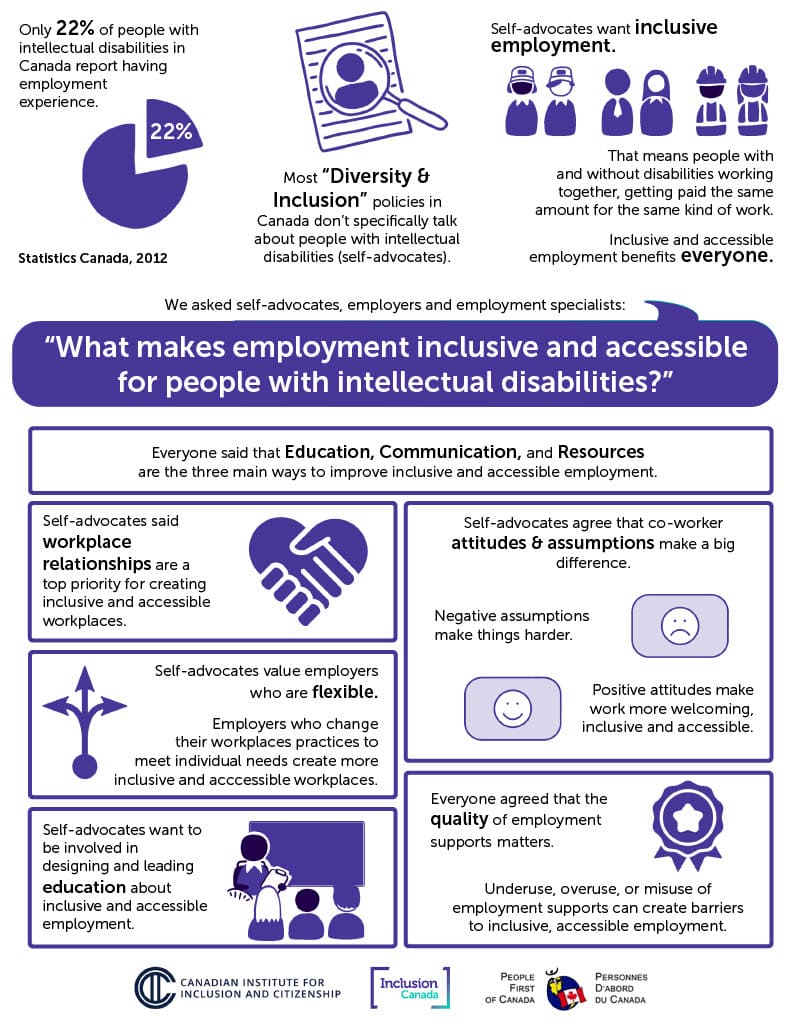Advancing Equal Access in the Workplace for Persons Who Experience Intellectual Disability
2023 Research Results
Fewer than one out of every four persons who experience intellectual disability has a job. The jobs they have do not pay much money and are often part-time.
Very little research has been done about work and employment standards for persons who experience intellectual disability. Most countries, including Canada, do not have any employment standards specifically for this group.
Inclusion Canada, People First of Canada and the Canadian Institute for Citizenship and Inclusion researched employment barriers and the needs of people who experience intellectual disabilities. Their final research report, “Advancing Equal Access for People with Intellectual Disabilities in the Workplace Project,” (March 2023) is now available.
Who Was Involved
The researchers spoke with 209 people, including:
- 85 persons who experience intellectual disability,
- 89 experts in employment for people who experience intellectual disability, and
- 21 employers who have persons who experience intellectual disability working for them.

Research Results
All self advocates in the study said that workplace relationships were the most important to them.
Many countries and employers have employment standards and programs for persons who experience disability. These standards and programs include all disabilities, and none focus specifically on persons who experience intellectual disability.
Programs for persons who experience disability help them find jobs and work. They do not seem to help persons who experience intellectual disability find jobs and work.
Six themes emerged – the full report includes key facilitators and barriers for each theme:
- Attitudes and Beliefs – Employers and co-workers make incorrect assumptions about persons who experience intellectual disability. For instance, they think they cost more to hire.
- Knowledge and Awareness – Employers and co-workers do not understand disability and how persons who experience intellectual disability learn.
- Accessible Processes – Processes and policies could be adapted for persons who experience intellectual disability, such as interview formats and modified hours.
- Accommodations – People think that accommodations will be huge, when often they are small, such as creating visuals for text-based manuals.
- Workplace Relationships – Employers must make persons who experience intellectual disability part of the team and the work culture to help others get to know them and see them as a person, not a label.
- Supports and Resources – Persons who experience intellectual disability value supports, such as a job coach. Lack of supports and work expectations can be barriers that limit opportunities.
Examples of Actions You Can Take
(See the report for all suggested actions.)
Education
- Information and learnings should be led by persons who experience intellectual disability.
- Success stories can help people learn how persons who experience intellectual disability succeeded in jobs and how problems were solved.
- Share best practices on how to be a good colleague to a person who experiences disability.
Communication
- Persons who experience intellectual disability need to connect with one another to help and support each other.
- Persons who experience intellectual disability can review documents to ensure they are in plain language.
- Allow persons who experience intellectual disability to speak for themselves.
Resources
- Self advocates are a good resource! They are experts about persons who experience intellectual disability and what they need.


